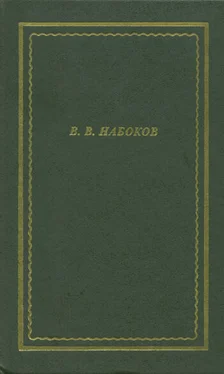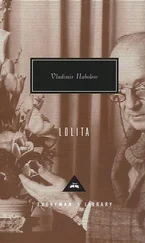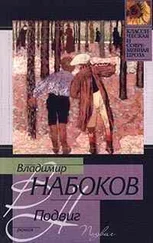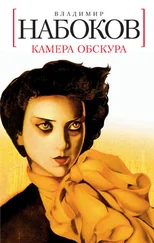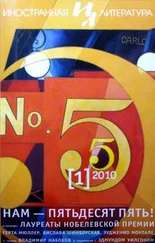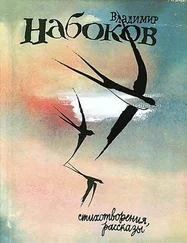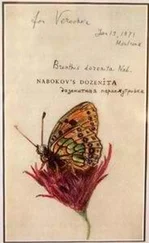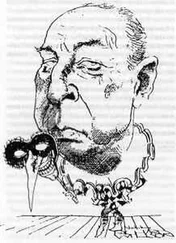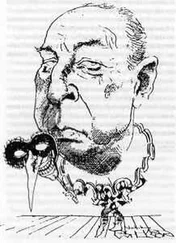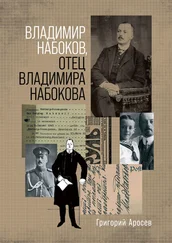Among the animals that haunt our verse,
that bird of bards, regale of night, comes first:
scores of locutions mimicking its throat
render its every whistling, bubbling, bursting,
flutelike or cuckoolike or ghostlike note.
But lapidary epithets are few;
we do not deal in universal rubies.
The angle and the glitter are subdued;
our riches lie concealed. We never liked
the jeweler's window in the rainy night.
My back is Argus-eyed. I live in danger.
False shadows turn to track me as I pass
and, wearing beards, disguised as secret agents,
creep in to blot the freshly written page
and read the blotter in the looking glass.
And in the dark, under my bedroom window,
until, with a chill whirr and shiver, day
presses its starter, warily they linger
or silently approach the door and ring
the bell of memory and run away.
Let me allude, before the spell is broken,
to Pushkin, rocking in his coach on long
and lonely roads: he dozed, then he awoke,
undid the collar of his traveling cloak,
and yawned, and listened to the driver's song.
Amorphous sallow bushes called rakeety,
enormous clouds above an endless plain,
songline and skyline endlessly repeated,
the smell of grass and leather in the rain.
And then the sob, the syncope (Nekrasov!),
the panting syllables that climb and climb,
obsessively repetitive and rasping,
dearer to some than any other rhyme.
And lovers meeting in a tangled garden,
dreaming of mankind, of untrammeled life,
mingling their longings in the moonlit garden,
where trees and hearts are larger than in life.
This passion for expansion you may follow
throughout our poetry. We want the mole
to be a lynx or turn into a swallow
by some sublime mutation of the soul.
But to unneeded symbols consecrated,
escorted by a vaguely infantile
path for bare feet, our roads were always fated
to lead into the silence of exile.
Had I more time tonight I would unfold
the whole amazing story — neighuklúzhe,
nevynossímo — but I have to go.
What did I say under my breath? I spoke
to a blind songbird hidden in a hat,
safe from my thumbs and from the eggs I broke
into the gibus brimming with their yolk.
An now I must remind you in conclusion,
that I am followed everywhere and that
space is collapsible, although the bounty
of memory is often incomplete:
once in a dusty place in Mora county
(half town, half desert, dump mound and mesquite)
and once in West Virginia (a muddy
red road between an orchard and a veil
of tepid rain) it came, that sudden shudder,
a Russian something that I could inhale
but could nor see. Some rapid words were uttered —
and then the child slept on, the door was uttered —
and then the child slept on, the door was shut.
The conjurer collects his poor belongings —
the colored handkerchief, the magic rope,
the double-bottomed rhymes, the cage, the song.
You tell him of the passes you detected.
The mystery remains intact. The check
comes forward in its smiling envelope.
«How would you say „delightful talk“ in Russian?»
«How would you say „good night“?»
Bessónnitza, tvoy vzor oonýl i stráshen;
lubóv moyá, otstóopnika prostée.
(Insomnia, your stare is dull and ashen,
my love, forgive me this apostasy.)
<2 декабря 1944>; Кембридж, Масс.
The room a dying poet took
at nightfall in a dead hotel
had both directories — the Book
of Heaven and the Book of Bell.
It had a mirror and a chair,
it had a window and a bed,
its ribs let in the darkness where
rain glistened and a shopsign bled.
Not tears, not terror, but a blend
of anonymity and doom,
it seemed, that room, to condescend
to imitate a normal room.
Whenever some automobile
subliminally slit the night,
the walls and ceiling would reveal
a wheeling skeleton of light.
Soon afterwards the room was mine.
A similar striped cageling, I
groped for the lamp and found the line
«Alone, unknown, unloved, I die»
in pencil, just above the bed.
It had a false quotation air.
Was it a she, wild-eyed, well-read,
or a fat man with thinning hair?
I asked a gentle Negro maid,
I asked a captain and his crew,
I asked the night clerk. Undismayed,
I asked a drunk. Nobody knew.
Perhaps when he had found the switch
he saw the picture on the wall
and cursed the red eruption which
tried to be maples in the fall?
Artistically in the style
of Mr. Churchill at his best,
those maples marched in double file
from Glen Lake to Restricted Rest.
Perhaps my text is incomplete.
A poet's death is, after all,
a question of technique, a neat
enjambment, a melodic fall.
And here a life had come apart
in darkness, and the room had grown
a ghostly thorax, with a heart
unknown, unloved — but not alone.
<13 мая> 1950; Итака
421. VOLUPTATES TACTIONUM [16] {*}
Some inevitable day
On the editorial page
Of your paper it will say,
«Tactio has come of age».
When you turn a knob, your set
Will obligingly exhale
Forms, invisible and yet
Tangible — a world in Braille.
Think of all the things that will
Really be within your reach!
Phantom bottle, dummy pill,
Limpid limbs upon a beach.
Grouped before a Magnotact,
Clubs and families will clutch
Everywhere the same compact
Paradise (in terms of touch).
Palpitating fingertips
Will caress the flossy hair
And investigate the lips
Simulated in midair.
See the schoolboy, like a blind
Lover, frantically grope
For the shape of love — and find
Nothing but the shape of soap.
<27 января> 1951
To think that any fool may tear
by chance the web of when and where.
O window in the dark! To think
that every brain is on the brink
of nameless bliss no brain can bear,
unless there be no great surprise —
as when you learn to levitate
and, hardly trying, realize
— alone, in a bright room — that weight
is but your shadow, and you rise.
My little daughter wakes in tears:
She fancies that her bed is drawn
into a dimness which appears
to be the deep of all her fears
but which, in point of fact, is dawn.
I know a poet who can strip
a William Tell or Golden Pip
in one uninterrupted peel
miraculously to reveal,
revolving on his fingertip,
a snowball. So I would unrobe,
turn inside out, pry open, probe
all matter, everything you see,
the skyline and its saddest tree,
the whole inexplicable globe,
Читать дальше
